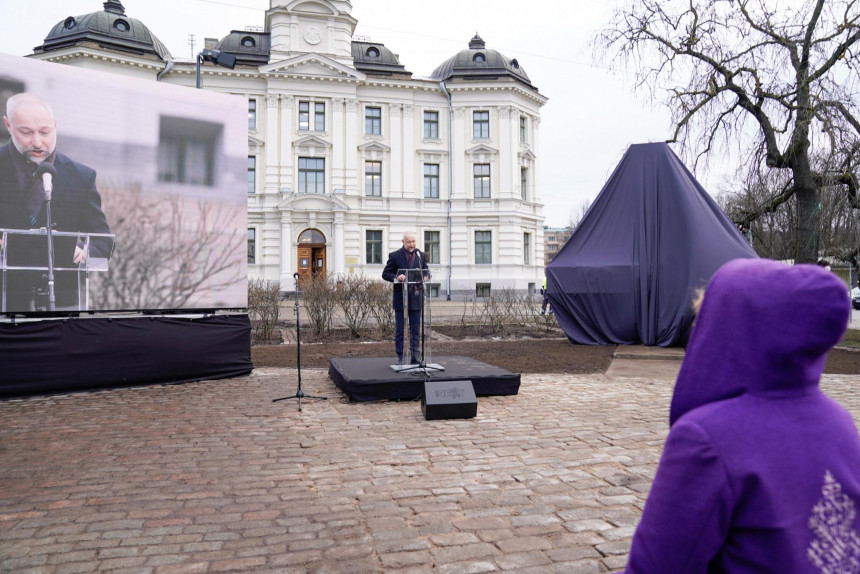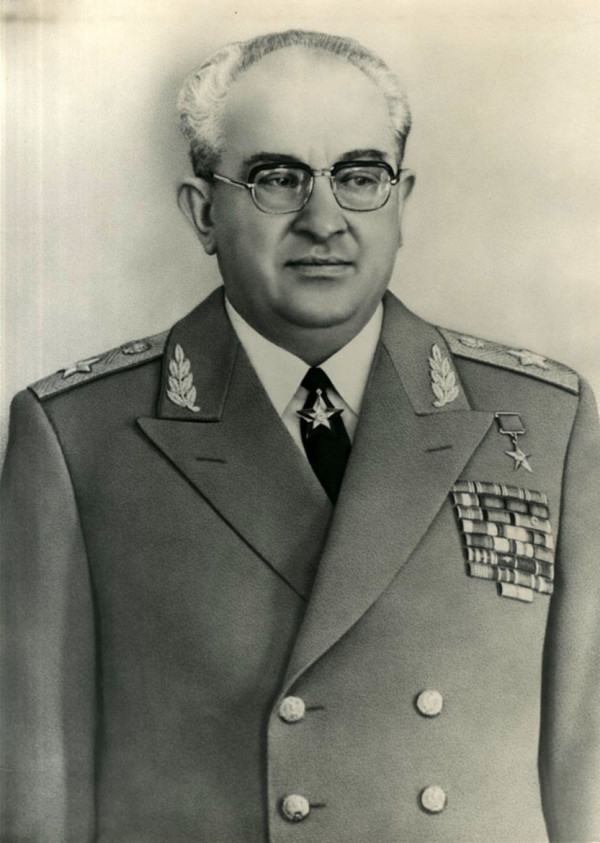Yuri Andropov's spiritual successor unveils a monument to one of the victims

The unveiling of the monument to Latvian freedom fighter Gunārs Astra also unveiled more than one cancerous growth of our political environment. But first, a little insight into the historical background, because for obvious reasons this background is unknown to young people, but also for those who lived in those times, much has faded from memory over the years. I have a pretty good memory and I remember the events of that time well.
On December 10, 1982, Leonid Brezhnev, the long-serving (at the time it seemed eternal) leader of the USSR, died. When this news was published two days later, on November 12, the main attention was drawn to the surname of the head of the organizing committee for the funeral (i.e. the successor) - it was Yuri Andropov, former chairman of the KGB, then Secretary for Ideological Affairs of the CPSU Central Committee.
Previously, most Western Kremlinologists (at that time you could listen to the BBC and Deutsche Welle in good quality of content and audibility, and Radio Svoboda in worse) thought that the most likely successor to Brezhnev would be his closet friend and protégé, the otherwise rather unremarkable Konstantin Chernenko, who suffered from asthma and was therefore always catching his breath. But although both were peers, Andropov had a much longer history in the corridors of the Kremlin. In the internal intrigues of the Politburo, he managed to outmaneuver Chernenko and succeeded to the throne himself - that is, grab the chair of General Secretary of the CPSU Central Committee.

Andropov counted as nothing less than an intellectual in these Kremlinologist legends. An aesthete who liked Western music, art. There are still stories today that he was supposedly the real father of the idea of perestroika and had the idea of converting "party gold" into capitalist property rights. Today's information shows that these legends, including about his aesthetic sophistication, are greatly exaggerated.
Unfortunately, as subsequent events show, Andropov's rise to power proved fatal for Gunārs Astra. Andropov was a hardened grandmaster of these games and a firm believer in strict discipline. I remember in January 1983, during the winter holidays, I was in Moscow and when I entered the canteen, the first question I heard was not "what would you like to eat," but "why are you not at work?" The always crowded department store next to Red Square - GUM - was half-empty in the middle of the day. The campaign to improve work discipline was in full swing.
In this atmosphere, in January 1983, a campaign of persecution of dissidents began throughout the Soviet Union. Latvia was also affected. In accordance with the practice of the time, the results of the campaigns were measured by their quantitative indicators. How many "anti-Soviet elements" had been caught. Boriss Pugo, then chairman of the Latvian KGB, was born in 1937 in Russia into the family of Kārlis Pugo, a Latvian communist who miraculously survived Stalin's repression. He knew from the time he was a child what it took to survive in that environment. Unquestioning obedience and blind following of the "general line". That is why Pugo took the directive to purge dissidents with demonstrative fervor.
The fact that the repression norm might not be complied with was out of the question. Almost everyone who could be considered a genuine critic of the regime was arrested, because, whatever the braggards of today's resistance movement may say, there was hardly any organized freedom fighter movement in Latvia at that time. There were only a select few hardliners - like lone oaks in a field.
Among these "oaks" arrested by the "Andropov draft" was Gunārs Astra, who was accused of virtually no serious offence. The distribution of the books he was accused of - George Orwell's "1984", Anšlavs Eglītis' "Laimīgie" and "Piecas dienas", Uldis Ģērmanis' "Latviešu tautas piedzīvojumi" and others - was nothing particularly criminal. Books of similar content were available semi-freely at the open-air book market in the Beberbeķi Forest, near the terminus of the No. 4 bus, in Brezhnev's time. I myself sold books there every Sunday and the KGB opened an operational case against me a year later, in 1984.
The Criminal Code of the Latvian SSR had two separate articles for virtually the same offence. One - Article 65 "For anti-Soviet agitation and propaganda", the other - Article 183.1 "For spreading deliberately false fictions that defame the Soviet state and social order". Depending on how severely the disobedient one was to be repressed, the article was chosen because "anti-Soviet agitation and propaganda" counted as a more serious crime with a longer term of imprisonment.
It is well known that after his release from his first imprisonment in 1976 (after 15 years in prison), Astra did not abandon his convictions, did not hide his anti-Soviet position and continued to maintain contacts with like-minded people throughout the USSR. Even by Soviet standards, Astra's "crimes" in 1983 were not serious enough to put him in prison. He was convicted because an old Chekist, Andropov, had come to power in the Kremlin and was trying to consolidate the power vertical with demonstrative severity. The aim was to establish such an order that no one would even think of objecting to anything or raising his voice.
Gunārs Astra was released from prison in February 1988, when the winds of change were already blowing in Latvia. At that time still weak, but tangible. The Helsinki-86 demonstrations at the Freedom Monument on June 14 and August 23, 1987, had already taken place, but the regime was still holding strong. Speaking about Latvia's independence or publicly pinning a red-white-red ribbon to the lapel of one's skirt was unthinkable. But Astra did not get to enjoy even these faint sprouts of freedom. On the way back from the camp in Mordovia, Astra fell ill, ended up in hospital in Leningrad and, unfortunately, never recovered. As Astra's internal organs were removed after his death and no independent post-mortem examination was allowed, there were suspicions that the KGB had a hand in his death, but this can no longer be proven.
Astra's funeral on April 19 at the Second Forest Cemetery turned out to be the first legal (non-dispersed) demonstration of freedom in the history of occupied Latvia. Astra's grave was filled in by people's hands. This was undoubtedly both a symbolic tribute to the deceased and a sign of readiness to continue the struggle against the occupying regime. The brass band at the grave played and those present (who knew the words) sang the unofficial Latvian anthem of the Ulmanis times - Leonīds Breiksis' "Svēts mantojums šī zeme mūsu tautai" (Holy heritage this land is to our people). Was "Dievs, svētī Latviju" (God Bless Latvia) also played? Maybe, but to be honest, I am not sure. There were a lot of people at the funeral, so it would be necessary to clarify this for history.
Why describe it all in such detail? Gunārs Astra was once killed by a campaign of persecution of freedom fighters launched by Yuri Andropov under the cover of the above-mentioned articles of the Criminal Code. What do we see now? The Astra monument is being unveiled by a man whose actions in recent years suggest that this man is not at peace with Andropov's laurels. All his rhetoric is based on an emphatic aggressiveness towards his imaginary enemies - put them in prison, restrain, no mercy and uncompromising repression. The crown jewel in this Andropov imitation game is the bill he has proposed on the dissemination of false fabrications, which is a literal transposition from the Criminal Code of the Latvian SSR.
Here's one: "Gross disturbance of public order, manifested in the public dissemination of deliberately false news or fabrications, disturbing the peace of people, the work of institutions, organizations - punishable by imprisonment for up to three years...", and the other: "Systematic dissemination of deliberately false fabrications, which defame the Soviet state and social order, orally as well as in writing, in print or in any other form, punishable by imprisonment for up to three years..."
As we can see, the only difference is that in one wording "false fabrications", for which one should be imprisoned, "defame the Soviet state and social order", and in the other, they "disturb the peace of the people, the work of institutions, organizations". Bordāns, Judins and other "experts", like the collaborator judges of the Soviet era, say that criminal liability will only be incurred when false fabrications are spread deliberately, people's peace is disturbed, etc. All these excuses are from the same series that led to Astra being tried and driven to his grave at the premature age of 56.
It should be noted that at that time hardly anyone in Latvia was prosecuted for these "false fabrications" for some time, but then Andropov came along - said it was necessary, and the little-used article suddenly resurfaced. To tell the truth, this article hung like the sword of Damocles over the heads of the entire population of the USSR. Everyone knew that if you made a lot of noise, there were articles that would definitely get you arrested. It was deeply ingrained in everyone's blood.
It is this atmosphere, where the regime feels cushioned on all sides, cut off from harsher criticism, that Bordāns and Judins are trying to recreate. There is no doubt that it is more comfortable for the authorities. And there is no need to tell us that these are very different times. I remember those times very well, and indeed freedom of expression is still incomparably greater than it was at the time of Astra's trial, but unfortunately, the trend towards ever closer similarities between the two regimes is unmistakable. It is likely that even now, no one will be punished under this article initiated by Bordāns for some time until at some point the political necessity arises, and then it will resurrect itself in a rather unpleasant way.
There is something else that must be mentioned. The fact that Bordāns was booed by some dubious characters during the unveiling of the Astra monument does not excuse him in the slightest. After what Bordāns has done, namely, after he tabled a bill worthy of Andropov, he no longer had the slightest right to take part in the unveiling of this monument. All his earlier merits in organizing the monument lost their moral power at that point. He has tarnished himself beyond repair by promoting such bills. The fact that the monument to Astra was unveiled by the ideological twin brother of Astra's indirect murderer, Andropov, is simply blatant and should not be kept quiet.